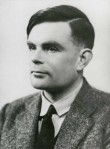I saw The Imitation Game on Saturday night. It was a good movie. I liked it a lot.
It was about a character called Alan Turing, a tormented and rejected genius who nevertheless, through sheer power of intellect, broke the German codes and hastened Allied victory during World War Two.
The most touching part of the movie was his relationship with a character called Joan Clarke, a brilliant woman whose gifts Turing recognized and fostered despite prejudices of the time against women, and who in turn helped bring the misfit Turing out of his social isolation and related to other people in a human way.
But as much as I enjoyed and admired the performances of Benedict Cumberbatch and Keira Knightly, I had a problem with the movie, and that is that the central character was named Alan Turing.
Because, as a little Internet research showed, the real Alan Turing bore no resemblance to the character in the movie. He was a much more interesting person.
The movie showed Alan Turing as emotionally crippled by the need to conceal his homosexuality. But he didn’t conceal it. Like many members of the Oxford and Cambridge intelligentsia, the real Alan Turning was openly and flamboyantly gay.
His biographers say he was moody, eccentric and had little tolerance for fools, but he was extroverted, gregarious and had a great sense of humor. What got him into trouble was not inability to express his emotions, but his lack of discretion.
He was one of the top mathematicians of his time, and worked with British intelligence on cryptography even before the outbreak of World War Two. He was recruited for the Bletchley Park codebreaking effort as a matter of course. He led a team consisting eventually of thousands of people. One of his assignments was to encrypt the personal messages between Winston Churchill and Franklin Roosevelt.
His breaking of the German code was not a once-and-for-all breakthrough as depicted in the movie, nor did he do it all by himself, even though his contribution, especially the use of machine intelligence for decoding, was essential.
Bletchley Park broke the German Luftwaffe code almost immediately, and the German Naval code later on. The Germans then thwarted the codebreakers for a time by complexifying the Naval code, but that obstacle, too, was overcome. Cryptography and codebreaking were and still are a continuing duel of wits.
Alan Turing never knew John Cairncross, the Soviet spy who infiltrated Bletchley Park, let alone agreed cover up his treason as shown in the movie.
After the war Turing continued to do work for a time for MI6 and its successor, GCHQ (General Communications Headquarters, the British counterpart to the U.S. National Security Agency. This was cut short when, under pressure from the U.S. government, the British government declared gays to be security risks.
Turing’s arrest and conviction for homosexual activity was unfortunate, and his sentence to a year of chemical castration, by means of hormone injections, was a horrible and unjust ordeal. But it didn’t inhibit his intellectual activity and his work on the theory of artificial intelligence during that period or for the year after.
Nobody knows why he committed suicide, and there are those who wonder if his death really was suicide.
